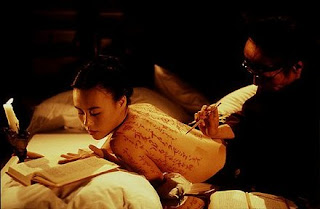The Pillow Book (1996) is one of the most visually interesting films I’ve ever seen. It’s a pity that Writer/Director Peter Greenaway wasn’t as creative with the story as he was with the movie’s look. Layered and superimposed images cover this film throughout, but the narrative itself is flat and uninspiring. This is one of those movies that you can almost imagine the writers sitting around saying “and now it’s time to open the second act,” as if the three act structure were a batter’s box stencil waiting to be chalked before a game.
Nagiko is a woman with a strange sexual appetite. Her two primary memories of childhood have shaped her erotic fantasies. As a girl, her father would paint her face on each birthday as he recited a fable about God painting life into the creatures of the earth. On one birthday, her mother presents her with the Pillow Book, a recording of sexual encounters, of a 10th century Lady of the Imperial Court . When she grows, she searches for a lovers who will paint her body as her father once did, whom she can record in her own such diary. Through voiceover she confesses that she does not know which she finds more satisfying; a good lover who is poor a calligrapher or vice versa. This search for lovers essentially encompasses act I, and includes her rejection of her arranged marriage, as her neglectful husband finds her specific desires distasteful.
Act II begins after she moves to Hong Kong and meets an English writer (Ewan McGregor) who fulfills both her passion for the written word and her unrelenting sexual desires. Their torrid affair leads her to a plot for revenge against his publisher, the same man who was briefly her father’s lover and whom she blames for his fall from grace. After the plan begins to unravel as jealousy and infidelity take hold, Act III details the revenge she enacts against the unscrupulous and vile printer. In a pattern that mirrors her earlier search for lovers, Nagiko now seeks out men on whom she can write the passages of her Pillow Book, dangling them in front of the eager and greedy publisher. The First and Third Acts serve essentially as bookends to the effective portion of the narrative, which simply isn’t enough to save this film.
Vivian Wu is efficient here in the daring role of Nagiko, but her performance is lost in a film that picks up speed too late and relinquishes it just as it’s getting good. The real surprise is the casting of McGregor in a role that his Star Wars followers would likely be shocked by. Frankly, he’s a distraction, but it may be internal retrospective career typecasting that yields that feeling on my end. I find him so brilliant in the same year’s Trainspotting, but here he feels so out of place. I almost wonder if that was what Greenaway was going for. In either case, it is interesting to see another risky role he took before he hit stardom, albeit ineffective.
Grade: 1.5 Hats Off


0 comments:
Post a Comment